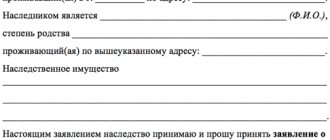The parents of the deceased can inherit his movable and immovable property with the obligations associated with it. Inheritance occurs both by law and by will. Article 1141 of the Civil Code of the Russian Federation (Civil Code of the Russian Federation) defines the main provisions regarding inheritance by law. The parents of the deceased are among the first-degree heirs. They receive the inheritance in equal shares , unless one of them has grounds for receiving a larger share.
A citizen has the right to indicate his parents in the will, determine their share, or deprive one of them of inheritance. At the same time, freedom of testament is limited by the right to an obligatory share, which the disabled have.
Inheritance by law or by will can be renounced , including in favor of another person.
Inheritance to a son by will
The procedure for entering into inheritance under a will after the death of a son or other relative is regulated by Chapter 62 of the Civil Code of the Russian Federation (Section 5, Part 3).
A testamentary document is drawn up by the testator during his lifetime with mandatory notarization. In the last order he may indicate:
- one or a list of recipients of inherited property;
- unworthy claimants to inheritance;
- conditions of receipt;
- additional recipients, in case those listed above refuse inheritance rights.
In this case, the will may indicate the share of each person (mother, father, children) in the inheritance of the deceased son. If the testator does not do this, then all property will be divided equally between the declared heirs of the 1st stage.
Despite the freedom of expression of will under a will, some categories of citizens have the right to an obligatory share of the inheritance after the death of a son or father (Article 1149 of the Civil Code). Namely:
- children of the testator under 18 years of age;
- disabled children, parents or spouses;
- persons who were the legal dependents of the testator during his lifetime and were declared incapacitated.
Moreover, this share must be at least half of the total inherited property. If there are several such citizens, then the obligatory share of the inheritance is divided among everyone after the death of the son/daughter.
It is important to know that the spouse has a legal right to half of the property only if it was acquired while living together.
That is, the mother/father's share of the inheritance after the death of a daughter/son is enshrined in law, even if they are not mentioned in the will.
Article 1149 of the Civil Code of the Russian Federation “The right to an obligatory share in the inheritance”
Can a mother be an heir after the death of her son?
The primary heirs are determined by Article 1142 of the Civil Code of the Russian Federation (hereinafter also referred to as the “Civil Code of the Russian Federation”).
They are:
- parents (except for those cases where they have been deprived of parental rights);
- children (of any age);
- spouse (with whom the deceased was in an officially registered marriage and such marriage was not dissolved at the time of death).
If all the heirs of the first circle of inheritance are alive, are not unworthy persons and have not refused to enter into the inheritance, then they will all receive equal shares.
The mother, as the heir in first place, will also receive part of her son's inheritance.
It is important to note that if the man was married, then their joint property with his wife will be divided in half, in accordance with the provisions of Article 1150 of the Civil Code of the Russian Federation. One part will remain with the wife, and the second part of the property will be included in the inheritance share for redistribution among the heirs.
If a man at the time of his death had a living mother and father, and also had an official wife, then all his property will be divided between them in the proportion of 1/3 each.
In the same case, if the deceased left a will, the property will be distributed according to its terms.
The will can provide for any heirs, however, the freedom of testamentary will will be limited by the imperative norms of Article 1149 of the Civil Code of the Russian Federation, according to which, regardless of who is indicated in the will, compulsory heirs must receive part of the inheritance.
According to the Civil Code of the Russian Federation, such heirs include:
- minor or disabled children (both natural and adopted);
- disabled parents (including adoptive parents) and surviving spouse;
- other disabled dependents who were dependent on the deceased for at least a year before death.
The testator could indicate that only his wife and father receive the inheritance. The will is not required to indicate the reasons that prompted its compiler to outline the circle of heirs in this particular composition, just as he will not be required to indicate the reasons for the disinheritance of the mother.
If the will is drawn up in this way, then the father and wife of the testator will each receive ½ share of the inheritance.
But if the testator’s mother is disabled (due to age or disability), then she will receive part of the inheritance as a compulsory heir.
According to the law, a compulsory heir must receive at least half of what would be due to him if he inherited by law.
Who has the right to inheritance after the death of their parents?
Can a brother be a first-line heir? Read here.
Who has the right to inheritance in the first place, read the link:
In the above example, in the absence of a will, the wife would receive 1/3 of the inheritance share. Half of this value is 1/6 of a share.
Thus, the disabled wife will receive 1/6 of the share, and the entire remaining inheritance will be divided between the wife and the father of the deceased testator in equal shares.
If the mother of the deceased was not his own, but she carried out the adoption procedure in the past, then she is equal in the legal sense to the biological mother and will have the right to inherit first of all by law or to be a mandatory heir in case of incapacity.
In the same case, if the adoption procedure was not carried out, and the woman was only a stepmother in relation to the deceased, then she will inherit only in the seventh stage.
Inheritance to a son by law
Regulates the right and order of inheritance after the death of a son (other relative) according to the law of Ch.
63 Civil Code of Russia. Articles 1141-1145 list heirs in 1st, 2nd, 3rd and subsequent order. The parents of a deceased child belong to the 1st stage, as do the spouse and children. This also includes the grandchildren of the testator, as well as their descendants. But grandchildren can inherit if the sons of the testator die. In this case, property is inherited by right of presentation (Article 1146 of the Civil Code).
Inheritance by law occurs if the testator did not leave a will. According to this method of inheritance, there is no right to an obligatory share. If the father/mother takes over the inheritance after the death of the son/daughter, then this fact is not important. Since the right of parents to the inheritance of a deceased son/daughter gives priority to inheritance.
Attention! Subsequent queues will be able to present their rights only if there are no relatives of the 1st queue.
Article 1141 of the Civil Code of the Russian Federation “General Provisions”
Read also: Does a common-law wife have the right to inheritance?
Article 1142 of the Civil Code of the Russian Federation “Heirs of the first stage”
Article 1143 of the Civil Code of the Russian Federation “Heirs of the second stage”
Article 1144 of the Civil Code of the Russian Federation “Heirs of the third stage”
Article 1145 of the Civil Code of the Russian Federation “Heirs of subsequent orders”
Article 1146 of the Civil Code of the Russian Federation “Inheritance by right of representation”
If there are no applicants in any queue
The legislation also provides for the case when a son/daughter has died, and none of the relatives in the 1st to 7th stages have claimed their rights to the inheritance.
Then inheritance occurs by right of presentation (Article 1146 of the Civil Code). The heirs of the heirs can present this right if the latter died before the opening of the inheritance or together with the testator. Among them there are also three queues:
- with priority, the inheritance passes to the grandchildren after the death of the son;
- 2nd stage - these are nephews;
- Stage 3 includes cousins/brothers.
This inheritance can only be applied if the testator did not leave a will, that is, by law.
It is important to know that the share of the inheritance upon presentation after the death of a son is distributed equally among all “representatives”. And they inherit only the part that their older relative claimed.
Parents' share in inheriting children's property
In accordance with Art. 1143 of the Civil Code, parents are heirs according to the law of first priority. This line also includes the children and husband (wife) of the testator. The rights of these family members during inheritance are equal, therefore, everyone is entitled to the same share.
Example: My son died. The circle of his heirs consists of: mother and father, wife and one child. How are shares calculated? Each of these persons will be entitled to 1/4 of the share.
Property will be divided somewhat differently between family members, including parents, if there is a valid will. Any citizen has the right to bequeath property (Article 1120 of the Civil Code). A will can determine who will receive all or some part of the property. It is not necessary to bequeath to a relative. In principle, anyone can become an heir under a will.
So, if after the death of a citizen it turns out that he managed to draw up a will during his lifetime, then the property will be transferred to the heir under the will. If parents are not included in the will, they will not be able to inherit their child's property. However, the law provides that parents can claim the inheritance of their children, regardless of the contents of the will, if they are disabled due to age or health (pensioners, disabled people).
These persons are entitled to the so-called obligatory share (Article 1149 of the Civil Code). It is no less than half the share that would be due to them if the property were inherited by law. Thus, disabled parents have the right to a part of the inheritance after the death of the child, even if there is a will in favor of other persons.
The main stages of registering the acceptance of an inheritance
The Russian Civil Code (Article 1153) stipulates two methods for accepting an inheritance - in fact and with the help of notarization. In both cases, the parents will first have to register the right of inheritance to own property after the death of their son. You can arrange an inheritance after the death of your son/daughter by taking some steps.
Article 1153 of the Civil Code of the Russian Federation “Methods of accepting inheritance”
Where to contact
At stage 1, you will need to accept the property left after the death of the testator, and in its entirety.
You cannot receive only part or refuse it, including debts. The actual method of inheritance is used in certain cases:
- inheritance, for example, an apartment, is used after the death of a son/daughter and is adequately supported by parents or other successors;
- the property is safe and secure, ensured by the heirs;
- the son/daughter died, and the father/mother (recipients of the inheritance) assumed the share of the inheritance and all obligations, including debts.
When contacting a notary, you must meet the necessary deadlines for entering into your inheritance rights. The period required for their adoption is 6 months from the day the testator died. In order for parents to enter into rights to the inheritance of their deceased daughter/son, they need to make actual acceptance within the specified time frame or draw up an application on a special form. Moreover, this can be done either in person, by coming to the office, or delivered with a proxy or sent by mail (documents - an application and a power of attorney for the proxy to act - must be notarized).
According to Art. 1115 of the Civil Code, an inheritance case is opened in a notary office located closer to the place of last registration of the deceased or the largest property (for example, residential premises). Inheritance cases can be distributed among notaries, in accordance with the letter with which the surname of the deceased begins.
To find this office and notary, you can go to the region’s website and look at the list with all contacts. A phone call will help clarify where and who exactly is involved in the inheritance matter.
Read also: Registration of ownership rights to real estate
The presence/absence of a will is reported by a notary on the day of death of its maker. If the date is uncertain, it will be made public upon the fact that he is declared dead in court. A will can be open or closed. In the first case, acquaintance with him is possible through family ties. In the second, only in the presence of all persons determined by the testator himself before the death.
Article 1115 of the Civil Code of the Russian Federation “Place of opening of inheritance”
Required package of documents
Having moved to the second stage, in order to receive an inheritance after the death of their son/daughter, parents first of all need to obtain a certificate confirming the fact of the death of the testator. And also collect the following documents:
- extract from the house register (last registration);
- a copy of the DM from the Criminal Code;
- a certificate of family composition and all persons registered in the living space of the deceased owner;
Family composition certificate form - a copy of the will;
- papers with proof of relationship between the successors and the testator;
- applicant's passport;
- information about the presence of other applicants for the inheritance;
- plan and explication of housing from the BTI and Rosreestr;
- documents on the testator's property: extract from the Unified State Register or certificate;
- other documents of title for ownership of property (court decision, contract, etc.);
The required package of documents also includes an application filled out in person at a notary's office by the parent who enters into the inheritance after the death of their son/daughter.
State duty upon entering into inheritance
The duty is paid in accordance with the Russian Tax Code (clause 22, article 333.24), since the mother/father’s share in the inheritance after the death of the daughter/son is acquired profit. The amount of the duty established by the state depends on the degree of relationship with the deceased and the size of the inherited property received or its share:
- 1st and 2nd priority (parents, children, spouses, brothers/sisters) - 0.3% of the inheritance valuation amount (not more than 100 thousand rubles);
- the rest - 0.6% of the assessed amount (no more than 1 million rubles).
The law provides for tax benefits. Persons who are heirs are exempt from it:
- living space and at the same time lived on it together with the deceased;
- property of citizens who died in the performance of public duty;
- property of victims of political repression;
- cash on bank deposits, from pension payments and rewards for intellectual abilities;
- insurance payments resulting from death and industrial accidents.
Those who do not pay the state fee include children under 18 years of age and incompetent persons. Disabled people of groups I and II can apply for a discount of 50% of the fee.
Article 333.24 of the Tax Code of the Russian Federation “Amount of state duty for performing notarial acts”
Deadline for inheritance
At the last 4th stage, the notary examines the inheritance case within the six months approved by law.
When it is closed, all successors established by the fact of inheritance are issued a certificate. It confirms the right to accept an inheritance. This document is the basis for re-registering the received property in your name. The six-month period can be extended upon the opening of an inheritance for new persons who have received this right due to:
- refusal of one of the heirs (the period of entry into legal ownership is 6 months from the date of refusal);
- non-acceptance of inheritance by other persons (additional 3 months as soon as six months have passed from the date of death of the owner of this property).
If the deadline for acquiring legal ownership of the property has been missed, and no one has refused it and there has been no failure to accept the inheritance, you can negotiate with the heir so that he agrees to be included in the list of successors.
In the event that the opening of the inheritance did not take place due to the fact that no one showed up or the only successor was late on the date of entry, the property, as escheated, goes into the state fund or into the ownership of municipalities. In this case, the issue will have to be resolved in court. To do this, a claim is filed, but there must be a good reason for the delay (ignorance, serious illness, illiteracy, etc.). The defendants are those who are currently the heir.
Read also: Post-mortem psychological and psychiatric examination
Step-by-step instructions for opening an inheritance case to restore rights without a will and in the absence of disputes:
- oral and written consent of all legal successors, certified by a notary;
- the notary redistributes the shares of the inherited property;
- certificates of inheritance rights issued previously are canceled and new ones are issued;
- re-registration in the state register.
As a rule, the fact of reviewing an inheritance case is decided not by agreement, but in court.
Procedure for registration of inheritance
After the death of a son or daughter, inheritance rights are formalized in the following order:
- on any day after the opening of the case (from the date of death), the applicant must, within six months, contact a notary at the place where the inheritance was opened. The place is determined by the address of his last residence or the location of the property, if the address of residence is unknown;
- submit an application to a notary to enter into inheritance rights;
- at the end of the six-month period, re-apply to the notary for a certificate of title;
- re-register the specified property in your name if it is subject to registration.
Download the application for acceptance of inheritance (sample/form)
In addition to the application, the notary needs to submit some documents:
- passport or other document that confirms the applicant’s identity;
- confirming family ties with the deceased. In this case, it will be a birth certificate or, for example, a judicial act establishing paternity;
- death certificate of the testator;
- confirming ownership rights to property that is subject to transfer to heirs.
The mother and father can provide the notary with information about other heirs, but are not obliged to do so. However, in this case, their chance of reinstating the missed entry period increases.









